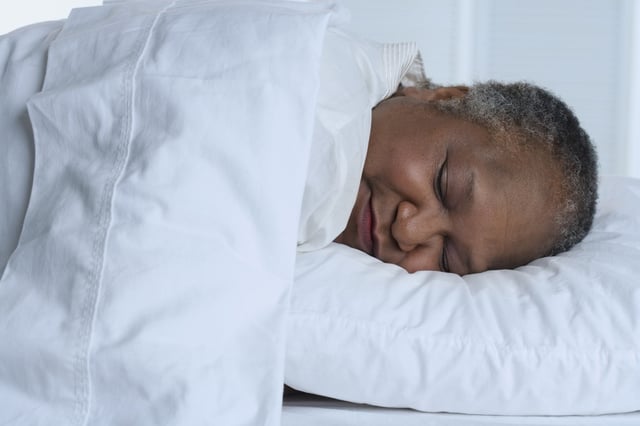Our guest blogger, Lisa Gonzalez, has had years of experience with volunteering in nursing homes and organizing local senior activities. Realizing that this was her passion is what got her involved with ElderCorps.org, a resource geared towards the care and well-being of the aging population.

Have you noticed that senior citizens tend to sleep less than those below the age of 65? Studies have shown that elderly individuals have more trouble falling asleep and staying asleep than their younger counterparts. While there are numerous causes for these sleep-related issues, it is important that everyone from millennials to seniors get quality rest.
How Sleep Changes Over Time
According to the National Sleep Foundation, humans go from needing up to 17 hours of sleep a day as a newborn to needing a minimum of 7 hours of sleep as a senior citizen. While this 10 hour shift may seem dramatic, it is important to remember that it occurs over an extended time period.
Additionally, once a person reaches his or her young adult years, the amount of sleep needed changes very little, if at all. In other words, once your body is fully developed, you should require a similar amount of sleep for the rest of your life. Though seven to nine hours per night is recommended for adults, there are variations from person to person.
Why Sleep Changes As We Age
Each stage of our lives comes with its own natural sleep needs:
Ages 0-5 Years: During this time, children’s bodies and brains are developing at a rapid pace, thus, requiring 10-17 hours of sleep each night.
Ages 6-17 Years: As children get older, their bodies are preparing them for the transition to adulthood. While they are still developing, the process is not happening as fast as it previously was. As such, they typically only require 8-11 hours of sleep during this time.
Ages 18-64 Years: At this time, our brains and bodies have become fully developed, which means we only require sleep to restore any damage done during our waking hours. During these years, the amount of sleep needed remains relatively constant, at about 7-9 hours per night.
Ages 65+ Years: During this time, seniors still require a similar amount of sleep as their younger counterparts (7-8 hours per night). Unfortunately, many seniors find it increasingly difficult to sleep after age 65.
Development throughout life, amongst other factors, dictates how much sleep we require. Once we hit age 65, however, many natural changes occur that can disrupt our sleeping patterns. These can include:
Changes in Melatonin Levels: Some doctors suggest that elderly individuals produce less of the hormone Melatonin, which is partially responsible for sleep.
Changes in Circadian Rhythm: Our Circadian Rhythm is our own personal internal clock that tells our bodies how to function properly throughout the day. Some doctors believe that this rhythm becomes increasingly off balance as we age.
Development of Insomnia: Sleep disorders, mental health issues (such as depression), physical ailments, and sometimes even surroundings can all lead to insomnia or sleeplessness and affect senior health. As we age, we are more prone to health-related issues, making it more difficult to sleep. Other factors that may contribute to sleeplessness in senior citizens include:
- Lack of exercise
- Lack of social interaction
- Lack of proper nutrition
- Frequent trips to the bathroom
- Concerns or anxiety about aging
- Physical pain
- Certain medications
- Insufficient nighttime routine
Sufficient sleep is crucial for everyone, regardless of age, as it factors into many parts of our lives. However, as the elderly community is already at higher risk of medical and mental health issues, it is important that they are not exacerbated by improper sleep.











